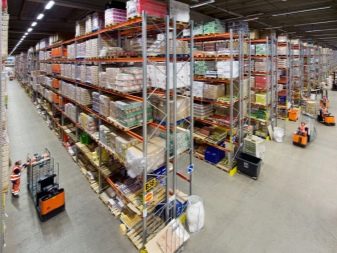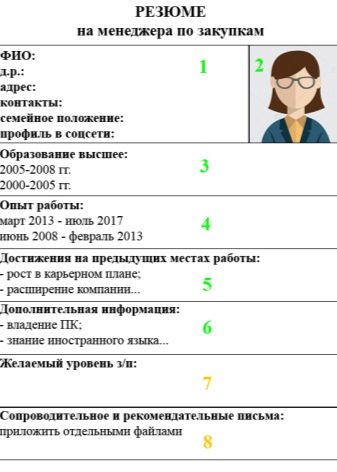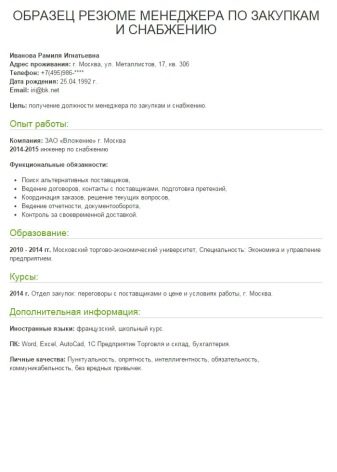Purchasing manager: job descriptions and requirements

In modern society, the profession of a manager is quite popular and in demand, but not everyone fully understands the essence of this type of activity. In addition, many have a somewhat generalized idea of this work, and few people know that the managerial profession is subdivided into many separate branches. For example, HR managers specialize in the selection of qualified personnel, while event managers base their activities on organizing various kinds of events. There is also a branch of procurement specialists whose activities are fundamentally different from those of other members of the profession.
Let's take a closer look at the essence of the procurement manager's activities, main job responsibilities, requirements and other important nuances associated with this profession.
Who is that?
A purchasing manager is a rather important part of the staff of any company, especially when it comes to a trade enterprise. Exactly the duties of this specialist include the search for the most profitable trade offers, communication with suppliers, the purchase of everything necessary and the execution of the appropriate documentation.
The level of supplying the organization with everything necessary will directly depend on the qualifications and personal skills of the professional, as well as to some extent the financial position of the company, since a competent specialist will always be able to organize work in such a way that it will be profitable to save money on the purchase of some goods or equipment without sacrificing quality acquired.

In some especially large companies, for these purposes, even a special department is created, whose employees have certain, delimited tasks, due to which their work is more harmonious and measured, because more than one person is involved in the whole process, respectively, there is no rush, the risk of confusion is minimized. For example, the practice of assigning employees to departments is typical for organizations involved in public procurement. It can be agricultural products of a different spectrum, as well as various varieties and types of grain crops. In some cases, the manager may even need an assistant to whom he can assign some of the responsibilities for the purchase of grain and other products.
Very often, purchasing departments can be structured as follows:
- the general manager holds a leading position in the department and the main part of the most responsibilities, respectively, lies with him, which makes him responsible for the work of the entire department;
- the manager has several assistants to simplify his work, who can help in finding profitable offers and organizing meetings with suppliers.

Advantages and disadvantages of the profession
Like any other field of activity, the purchasing manager profession has its merits, but not without its drawbacks.
The indisputable advantages include the following:
- constant study of the supply market, which to one degree or another contributes to a more intensive development of professional skills;
- thanks to the huge number of contacts with manufacturers of various goods and representatives of selling companies, you can acquire a good circle of acquaintances that may be useful in later life;
- in some cases, it is possible to purchase foreign-made goods, which cannot be selected at a distance, since it is necessary to personally verify the quality of the product; that is why specialists in this field are provided with regular business trips abroad, in which you can also find time for personal leisure;
- the level of salary will always depend personally on your skills and professionalism, so you can be sure that really high-quality work will always be appreciated according to its merits.
Among the disadvantages, the following are most often noticed:
- a very high degree of responsibility that is assigned to a specialist - the functioning of the company as a whole depends on the purchasing manager, since the quality of the goods and the profitability of the transaction will directly affect the financial position of the enterprise;
- in the absence of the necessary materials and raw materials from the usual suppliers, the specialist will have to urgently look for new ones, negotiate and draw up new terms of contracts;
- it is necessary to correctly calculate the amount of goods and raw materials to be purchased, since a shortage can lead to problems in production, and an excess can lead to financial problems.


Responsibilities and functions
The duties of a purchasing manager, as well as the functions performed by this specialist, are very diverse, although they ultimately come down to one thing - carrying out purchases.
Let's take a closer look at what exactly this type of professional does:
- as previously stated, the main responsibility is providing the enterprise with everything necessary for its functioning;
- every procurement employee, must know how to maintain good business relationships with existing suppliershow to find new profitable offers;
- preparation of applications in the current time, which will indicate future orders - one of the main tasks;
- supply processes must be closely monitored, especially when it comes to cooperation with new suppliers, therefore, the manager's functional responsibilities also include tracking deliveries;
- in addition, a specialist must constantly monitor the supply marketlooking for new suppliers, as well as tracking changes in the range of old ones;
- according to the level of sales, which may increase or decrease, it is also necessary to correct the quantity of purchased materialso that a situation with its lack or excess does not arise;
- it is very important to keep track of new offers from regular suppliers, since in such cases it is possible to agree on more favorable terms of the transaction;
- in the case of the purchase of any category raw materials, for example, for food production or for a restaurant, you need to make sure of the quality of the goods, as well as the expiration date;
- and, of course, it is necessary solve financial issues in timeto avoid debts to suppliers.

Requirements
Job seekers wishing to associate their activities with this profession should be aware that there are certain requirements that relate not only to the professional standard, but also to personal qualities. Without the totality of all the requirements and a certain level of competence, it is impossible to become a real professional in your field.
Therefore, you need to familiarize yourself with the requirements in more detail and, by comparing them with your personal skills, do everything necessary in order to fit the position of a purchasing manager.
Qualities
Of course, a person holding such a position must be very extraordinary and have an active, confident life position. This is necessary in order to search for profitable commercial offers that meet the needs of the company. In addition, a solid internal "core" will help you to competently interact with competitors and conduct healthy competition. Self-confident people who also possess such qualities as sociability, positivity and sociability will find it much easier to negotiate and find a common language with direct partners.... A purchasing manager with an analytical mind will be able to easily solve even the most difficult problems, if not in favor of his company, then at least not to the detriment of it.
Responsibility and punctuality will help in interaction with bosses and partners, since it is these qualities that will help you look more professional in the eyes of others. Fast learning, dedication, as well as a high level of efficiency are the qualities that will help you develop in the professional field and achieve faster career growth.
Multitasking, dedication and resistance to stress are those personal characteristics that will help, when faced with difficulties, to adequately defend their position in any issue, while fulfilling official duties at the highest level.

There are also many other personality traits that a professional purchasing agent must have. But in this case, the basic qualities are presented, without which it is impossible to become a reliable specialist in your field.
Knowledge and skills
As for knowledge and professional skills, everything is a little more complicated here. The fact is that you can do without some personal qualities if the specialist is fluent in professional skills, but the employer simply cannot close his eyes to the absence of even some of them, even if you have very attractive personal characteristics.
The specialist must have the following knowledge and skills:
- first of all, the professional standard defines the need for higher education in management, thanks to which you will know all the subtleties of work, at least in theory, if there is no practical experience;
- it is impossible to do without a certain level of training in matters of business negotiations; employees who have completed training courses in this area are especially appreciated, where all the subtleties and important nuances of the process are studied in detail;
- in some cases it may be necessary to work with very large amounts of different information, therefore, a real professional should be well versed in the material and be able to quickly switch attention from one task to another;
- Besides, you need to have knowledge in the field of logisticsas well as have a certain level of knowledge in the field of civil and commercial legal system;
- welcomed knowledge of pricing, confident use of a personal computer, and experience in sales.

Education and career
Undoubtedly, each specialist should have a specialized education in his field, which allows him, at least in theory, to get an idea of the position that he will take in the future. But many people often think that to work in the procurement sector, it is enough to have only a diploma confirming qualifications in the field of management. This opinion is erroneous, since it is necessary to have a narrower, specialized knowledge about this area. Even if you have a degree in management, you definitely need to take a retraining course or take a course of additional education in the field of procurement management and separately familiarize yourself with public procurement, which are fundamentally different from the commercial activities of private enterprises.
In addition, many employers are in favor of conducting regular training for their employees, aimed at improving their qualifications and updating knowledge in accordance with the changing situation on the market and in the country's economy. You should be prepared for the fact that when you receive this position in any company, absolutely of any format and scale, initially you will start your career with a paid internship, upon successful completion of which you can already be considered a full-fledged purchasing manager... In the future, so that employees do not lose motivation to work, the boss should interest specialists, providing them with the opportunity for career growth. For example, in large companies where there are entire purchasing departments, you can start your career as a junior specialist, then get promoted to a middle or senior professional, and gradually progress to the position of department head.
Along with the rise in the career ladder, the level of responsibility and the number of tasks, as well as the level of remuneration, will also change.


Resume rules
In order for all the applicants to pay attention to you, it is necessary to draw up a competent resume in which you will be presented in the most favorable light for the employer.
Consider the following basic rules for writing a resume:
- do not stretch the story about yourself and your achievements over several pages; information should be concise and understandable;
- it is strictly forbidden to distort the facts, with regard to your training and work experience, since you will have to document this information with the help of a diploma of education or work book;
- the design must be holistic, therefore, it is recommended to use the same techniques for highlighting any important details, as well as a single font;
- to get the employer's favor in advance, it is recommended to attach your photo to your resume; it is best if it is a professional shot, where you are presented in a rather stylish, but discreet way;
- resume should be clean in terms of punctuation and spelling, as well as have a certain focus - it is recommended to initially indicate the position and level of remuneration to which you are striving;
- indication of personal achievementsreceived at the previous place of work is also welcomed.
In some cases, you can supplement your resume with a cover letter, in which you can notify the employer that you found the vacancy very attractive for you and find yourself quite worthy and suitable for certain parameters of the applicant. You can also list some personal qualities and briefly indicate the key points from the resume.










